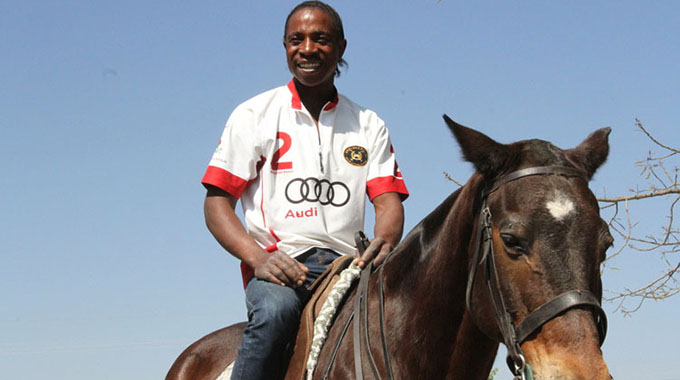Of polo fashion, culture and wine

Kundai Marunya Lifestyle Writer
Last year they made headlines with a wow factor theme — Posh Oh My Gosh — when fashion buffs wore from fur to animal print turning heads at the Carrick Ambassadors Cup.
The order of the day was fashion, food and obviously horses. All these were brought together by polo — they call it the gentlemen’s game.
Now, think expensive designer outfits that trumps your Sunday best.
The thrill of horses racing against the wind, eight on a 300-metre pitch chasing a ball.
Think exquisite cuisines, family bonding and a beautiful landscaping that is well curated to blend with the hills, rocks and indigenous trees, all being complemented by a glass of good wine.
This with an addition of hundreds of years of tradition, sums up polo — a sport that has grown into a culture and lifestyle for most of Zimbabwe’s wealthy.
What really is polo, one may ask.
A Wikipedia definition would be a “horseback mounted team sport; one of the world’s oldest known team sports. The game is played by two opposing teams with the objective of scoring goals by hitting a small hard ball with a long-handled wooden mallet, and through the opposing team’s goal.”
Someone who has spent a day at Bushman Rocks Safaris in Ruwa, one of Zimbabwe’s premier wine destinations, can have a very different answer.
They may have been there for the biggest event on local polo calendar, the annual Carrick Ambassador’s Cup (also known as the Ruwa July) or maybe for an interclub meet.
The common denominator in their answers is a touch of class and elegance.
One would think they have someone blacked out and woke up at Durban July in South Africa or in the English country side for a picnic, all depending on the day.
Well, this weekend it will definitely be the latter, fashionistas will have to wait for July.
This weekend it’s all about family picnic, wine and of course the sport.
One can get to relax and bond with their loved ones or even business partners with a front row seat at the game.
A table of six people costs RTGS$700 while four people can seat for RTGS$480, all coming with a basket whose contents include a bottle of Bushman Rock wine and a jug of lemonade.
At the heart of all these will be a celebration of mothers, after all it is Mothers’ Day.
None will be as proud as Mrs Meikles as she gets to see her two sons take on their father David Meikles’ sport. David is a former national team captain.
The two fourth generation polo players will be riding alongside their uncle — current national captain Gareth Meikles — representing Umzari Polo Club against Bushman Rock today and tomorrow.
It is through a deep culture embedded in the Meikles boys that has given them great command of the game.
To them it’s a source of pride and part of their culture for generations.
The tradition is, however, very expensive to keep.
One horse costs between US$25 000 and US$30 000 locally, while international prices range around US$150 000, going upwards depending on the horse breed, and genealogy.

Smart Kuusawa is one of the few blacks that play polo
For each horse one needs an average of US$6 000 for feed and upkeep per year.
A team is made up of either four or six players, which means at least eight horses are playing on the same field at a time.
With aforementioned prices, it takes a lot to keep a team, yet the high expense does not deter polo lovers.
“You can never put a price tag on tradition and sportsmanship. The love for polo, the fun, the culture, thrill and bond you create at the games can surpass any amount of money,” said polo player Michael Davies.
To strengthen a bond between genders and promote equality, polo is one of a few games that can have men and women playing on the same team.
“Polo is a game that balances scales of inequality. Though both genders can be on the same team, many women opt not to participate because of the roughness on the game and high risk of injury,” said Davies.
Though white people, because of history and tradition, dominates the sport, many black players have embraced polo and risen to be formidable players over the years.
There is one player who has defied odds, Smart Kuusawa, a farm labourer at Sambok Farm in Marondera whose love for polo sees him both tending to horses and riding them at a polo meet.
Speaking in a previously published interview Kuusawa said polo unites races.
“Most people I meet wonder how I became part of a white-dominated environment but the truth is that the love for polo brings us together, it makes us one.
“This is a sport that is fun and I would like to urge my fellow black Zimbabweans to try it out. Trust me once you fall in love with it you won’t want to go for a day without having a run,” he said.
To date 29-year-old Kuusawa has over 30 trophies, picked at tournaments played locally and regionally.
Off-field is, however, where many blacks dominate, embracing the culture, lifestyle and fashion.
Hopefully the thrill of the sidelines will draw more and more to the field.
Polo is truly the “sport of kings”.
It is only that their crowns are worn in different instances some on the field, some dressing up to cheer players on while others use the friendly environment build their castles in the business world.
All the same, everyone takes some joy and shed of royalty with them home.








Comments